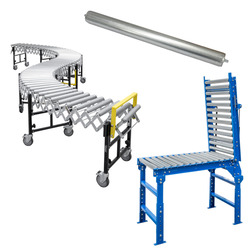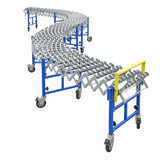Plastic Pallets: The Sustainable Solution for Modern Material Handling
Date Posted:13 August 2024
With their durability, versatility, and environmental benefits, plastic pallets offer a compelling alternative to traditional wooden pallets in various industries and applications.
In the world of material handling and logistics, pallets serve as indispensable tools for transporting, storing, and protecting goods and materials. Among the various types of pallets available, plastic pallets have gained significant popularity due to their durability, versatility, and sustainability. This article explores the features, benefits, and environmental advantages of plastic pallets in modern supply chain operations.
Durability and Strength
Plastic pallets are engineered to withstand the rigors of industrial environments and heavy-duty material handling operations. Unlike traditional wooden pallets, plastic pallets are resistant to moisture, mold, pests, and corrosion, making them ideal for use in food processing facilities, pharmaceutical warehouses, and outdoor storage yards. The structural integrity and load-bearing capacity of plastic pallets remain consistent over time, ensuring reliable performance and minimizing the risk of pallet failure during transportation or storage.
Versatility and Customisation
One of the key advantages of plastic pallets is their versatility and customization options. Plastic pallets are available in a variety of sizes, configurations, and designs to suit different applications and industries. Standard sizes such as 48x40 inches or 1200x800 millimeters are commonly used for international shipping and distribution, while custom sizes can be tailored to specific load requirements or storage constraints. Plastic pallets can also be equipped with features such as reinforced corners, anti-slip surfaces, and integrated RFID tags for enhanced functionality and traceability.
Sustainability and Environmental Benefits
Plastic pallets offer several environmental advantages over traditional wooden pallets, contributing to sustainability efforts and reducing carbon footprints in supply chain operations. Some of the key environmental benefits of plastic pallets include:
Longevity and Reusability: Plastic pallets have a longer lifespan than wooden pallets and can be reused multiple times without degradation or loss of performance. This reduces the need for frequent pallet replacement and minimizes waste generation in the supply chain.
Recyclability: At the end of their service life, plastic pallets can be recycled and converted into new plastic products or materials. Many plastic pallet manufacturers offer recycling programs or take-back initiatives to recover and repurpose old pallets, closing the loop on the circular economy.
Reduced Carbon Emissions: Plastic pallets are lighter in weight than wooden pallets, resulting in lower fuel consumption and greenhouse gas emissions during transportation. The use of plastic pallets helps to optimize freight loads and reduce transportation costs, leading to overall environmental benefits.
Hygienic and Sanitary: Plastic pallets are easy to clean and sanitize, making them ideal for industries with strict hygiene requirements such as food, pharmaceuticals, and healthcare. Unlike wooden pallets, which can harbor bacteria and pathogens, plastic pallets provide a hygienic and safe platform for transporting sensitive or perishable goods.
Industry Applications
Plastic pallets find applications across a wide range of industries and sectors, including:
Food and Beverage: In the food and beverage industry, plastic pallets are used to transport and store perishable goods such as fruits, vegetables, meat, and dairy products. Plastic pallets comply with food safety regulations and provide a clean and contamination-free environment for food handling and distribution.
Retail and Consumer Goods: In retail and consumer goods supply chains, plastic pallets are employed to transport products from distribution centers to retail stores or fulfillment centers. Plastic pallets help to protect merchandise from damage, reduce product losses, and improve inventory management efficiency.
Pharmaceuticals and Healthcare: In the pharmaceutical and healthcare sectors, plastic pallets are utilized to transport pharmaceuticals, medical devices, and healthcare supplies. Plastic pallets meet stringent regulatory requirements for cleanliness, sterility, and traceability, ensuring the integrity and safety of medical products throughout the supply chain.
Automotive and Manufacturing: In the automotive and manufacturing industries, plastic pallets are used to transport automotive components, machinery parts, and industrial materials. Plastic pallets offer durability, impact resistance, and dimensional stability, making them suitable for heavy-duty manufacturing environments and assembly line operations.
Plastic pallets have emerged as a sustainable and efficient solution for modern material handling and logistics operations. With their durability, versatility, and environmental benefits, plastic pallets offer a compelling alternative to traditional wooden pallets in various industries and applications. As businesses continue to prioritize sustainability and efficiency in their supply chain operations, the adoption of plastic pallets is expected to grow, driving innovation and advancements in pallet design, manufacturing, and recycling technologies.





























































































 Trolleys / Hand Trucks
Trolleys / Hand Trucks 2 Tier Trolleys
2 Tier Trolleys 3 Tier Trolleys
3 Tier Trolleys Aluminium Trolleys
Aluminium Trolleys Appliance & Hand Trucks
Appliance & Hand Trucks Cage Trolleys
Cage Trolleys Cleaning Carts & Trolleys
Cleaning Carts & Trolleys Construction Trolleys
Construction Trolleys Dollies
Dollies Foldable Trolleys
Foldable Trolleys Hospital Trolleys
Hospital Trolleys Laundry/Linen Trolleys
Laundry/Linen Trolleys Load Skates & Tow Tugs
Load Skates & Tow Tugs Mail / Office Trolleys
Mail / Office Trolleys Multi Purpose Trolleys
Multi Purpose Trolleys Multi-Tier Shelf Trolleys
Multi-Tier Shelf Trolleys Order Picking Trolleys
Order Picking Trolleys Panel Cart Trolleys
Panel Cart Trolleys Platform Trolleys
Platform Trolleys Powered Trolleys
Powered Trolleys Stainless Steel Trolleys
Stainless Steel Trolleys Tool Trolleys
Tool Trolleys Utility Carts
Utility Carts Warehouse Trolleys
Warehouse Trolleys Custom Trolleys
Custom Trolleys Lifting Equipment
Lifting Equipment Forklift Attachments
Forklift Attachments Jib Attachments
Jib Attachments Lifting Hoists & Pallet Hooks
Lifting Hoists & Pallet Hooks Manual Stackers & Lifters
Manual Stackers & Lifters Pallet Jacks
Pallet Jacks Pallet Lifters
Pallet Lifters Pallet Rotators & Dispenser
Pallet Rotators & Dispenser Powered Pallet Trucks & Electric Lifters
Powered Pallet Trucks & Electric Lifters Scissor Lift Trolleys and Tables
Scissor Lift Trolleys and Tables Conveyor Equipment
Conveyor Equipment Conveyor Frames
Conveyor Frames Conveyor Stands
Conveyor Stands Roller Conveyors
Roller Conveyors Skate Wheel Conveyors
Skate Wheel Conveyors Access Equipment
Access Equipment Container & Yard Ramps
Container & Yard Ramps Step Stools & Ladders
Step Stools & Ladders Work Platforms & Crane Cages
Work Platforms & Crane Cages Drum Handling
Drum Handling Drum Storage & Bunding
Drum Storage & Bunding Drum Trolleys & Lifters
Drum Trolleys & Lifters Forklift Drum Handling
Forklift Drum Handling Containment & Spillage
Containment & Spillage Aerosol Cans Storage Cages
Aerosol Cans Storage Cages Bunded Pallets & Storage
Bunded Pallets & Storage Corrosive Goods Storage Cabinets
Corrosive Goods Storage Cabinets Flammable Liquid Cabinets
Flammable Liquid Cabinets Forklift Gas Storage Cages
Forklift Gas Storage Cages Gas Cylinder Storage
Gas Cylinder Storage Site Storage
Site Storage Spill Kits
Spill Kits Stillage Cages
Stillage Cages Waste Handling
Waste Handling Bin Lifters & Tippers
Bin Lifters & Tippers Plastic Waste Bins and Carts
Plastic Waste Bins and Carts Steel Waste and Tipping Bins
Steel Waste and Tipping Bins Storage Equipment
Storage Equipment Heavy Duty Cabinets & Benches
Heavy Duty Cabinets & Benches Heavy Duty Shelving
Heavy Duty Shelving Mega Bins & Pallets
Mega Bins & Pallets Packing Benches
Packing Benches Pallet Racking Accessories
Pallet Racking Accessories Parts Trays & Stor-Pak Bins
Parts Trays & Stor-Pak Bins Pegboard & Louvre Panels
Pegboard & Louvre Panels Plastic Bins
Plastic Bins Plastic Handling Solutions Bins
Plastic Handling Solutions Bins Plastic Pallets
Plastic Pallets Stack & Nest Bins
Stack & Nest Bins Storage Cages
Storage Cages Workplace Equipment
Workplace Equipment Workbenches
Workbenches Modular Workbenches
Modular Workbenches Electric Height-Adjustable Workbenches
Electric Height-Adjustable Workbenches Floor Matting
Floor Matting Industrial Weighing Scales
Industrial Weighing Scales Pallet Wrapping & Packaging Machinery
Pallet Wrapping & Packaging Machinery Ramps
Ramps Stationery Cupboards
Stationery Cupboards Storage and Stillage Cages
Storage and Stillage Cages Tool Trolleys
Tool Trolleys Tooling Cabinets
Tooling Cabinets Wheelie Bins
Wheelie Bins Workshop Equipment
Workshop Equipment Safety Equipment
Safety Equipment Gloves and PPE
Gloves and PPE Pallet Rack Post Protectors
Pallet Rack Post Protectors Safety Barriers & Bollards
Safety Barriers & Bollards Safety Knives & Cutters
Safety Knives & Cutters Signs and Traffic Supplies
Signs and Traffic Supplies Tool & First Aid Boxes
Tool & First Aid Boxes Construction Equipment
Construction Equipment Concrete Equipment
Concrete Equipment General Site Equipment
General Site Equipment Lifting Equipment
Lifting Equipment Site Storage
Site Storage Waste
Waste 










